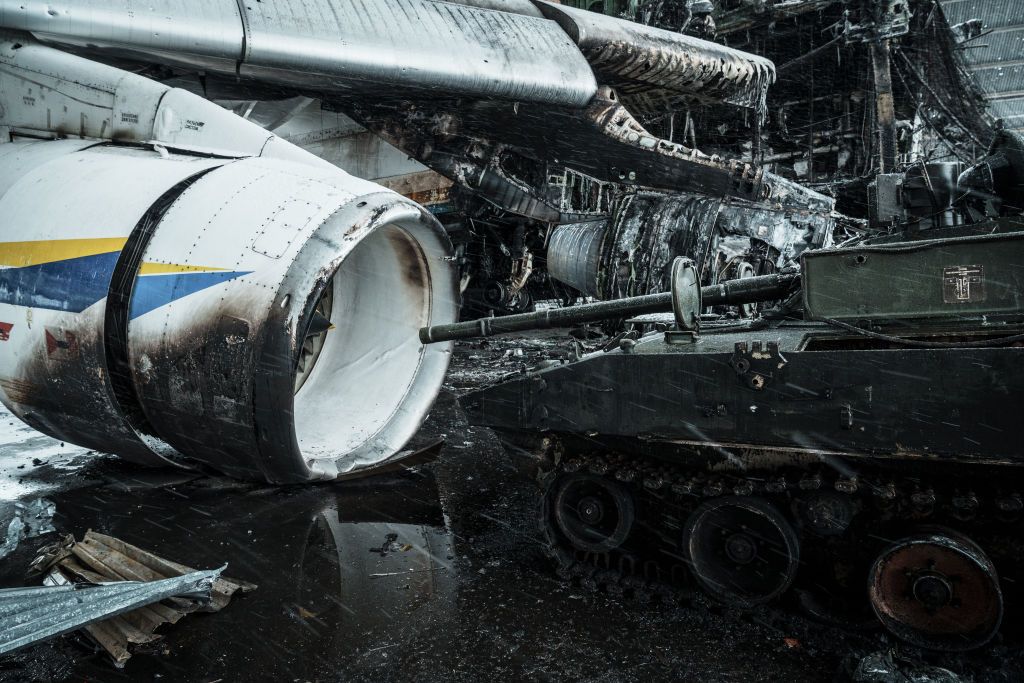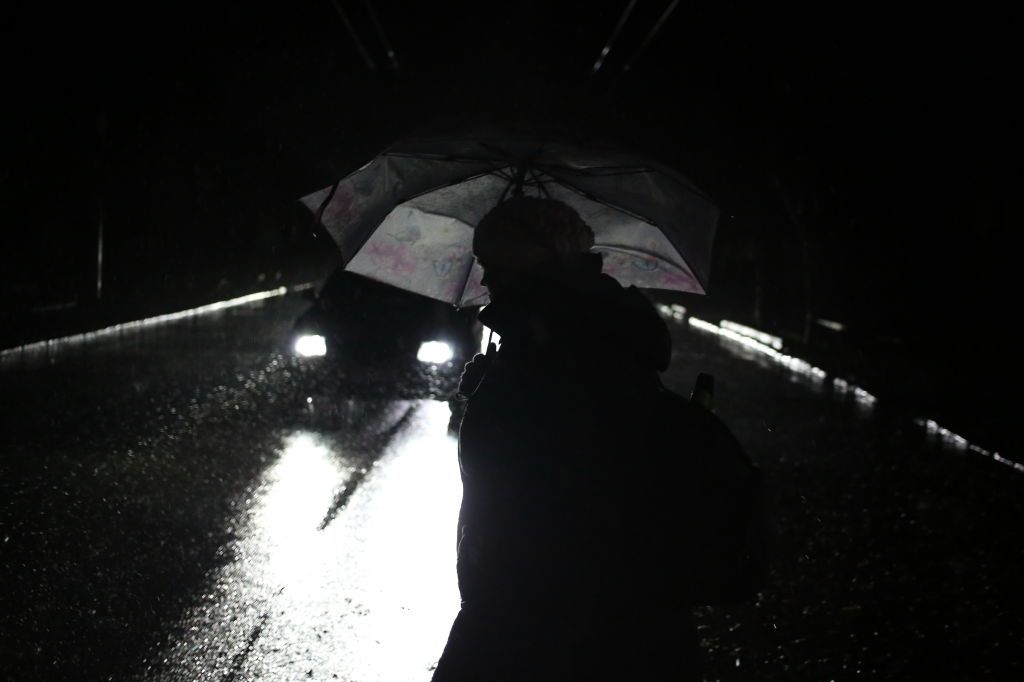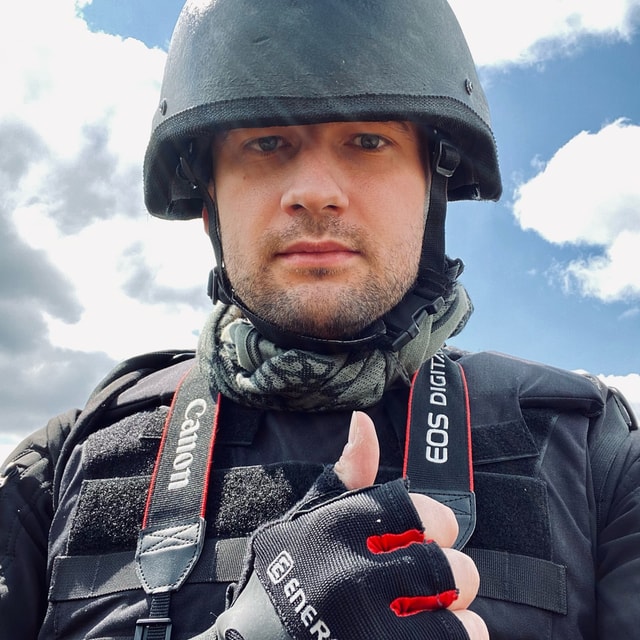Illia Ponomarenko: The story of wartime Kyiv

A Ukrainian soldier patrols on an armored vehicle on a street in Bucha, Ukraine, on April 2, 2022. (Ronaldo Schemidt/AFP via Getty Images)

Illia Ponomarenko
Former defense reporter at the Kyiv Independent
You can pre-order Illia Ponomarenko's book, "I Will Show You How It Was: The Story of Wartime Kyiv," on Bloomsbury or Amazon. See the end of the article for more information on the book's release.

The Battle of Kyiv, one of the critical events of Russia’s full-scale invasion of Ukraine, ended with a very unscripted Ukrainian victory just over two years ago. It feels like it's been a millennium since those days of February and March 2022.
We in Ukraine have had our drastic ups and downs in this fight. They stretch from Russian President Vladimir Putin’s rage-twisted face spelling the end of independent Ukraine on TV screens around the world, from the glorious liberation of Kharkiv Oblast and Kherson to the fields of death at Bakhmut or Avdiivka to the Ukrainian victory over Russia’s Black Sea Fleet.
These days, unfortunately, the situation is going downhill. For many months, we’ve been a hostage of domestic political strife in the United States, our foremost provider of defense aid. Our military is running critically low on battlefield munitions and air defense.
Russian forces are on a roll again, slowly creeping forward through the ruins of Donbas and marshaling their forces for yet another grand offensive this summer. We’re again at risk of a total blackout due to brutal Russian missile attacks that we can’t repel successfully anymore. Mobilization is at a standstill.
Demagogues around the world keep playing the jester over our setbacks, demanding our surrender. Our friends are ringing the alarm, trying to wake the West by explaining what’s at stake should Ukraine fail.
I'm not going to lie; many people right now, both in Ukraine and beyond, sometimes feel pretty close to desperation – especially when it comes to what we see on social media. A little hope is just what we need right now. When it comes to hope, my thoughts often go back to the Battle of Kyiv.
Historians of the future have yet to fully conceptualize Russia’s war against Ukraine, but I’m sure the sudden failure of Russia’s march into Kyiv will be remembered as one of history’s greatest moments.
As half of the world predicted the fall of Kyiv within 48 to 72 hours, Ukraine single-handedly prevented one of the world’s biggest war machines from taking its capital, effectively derailing Putin’s so-called “special military operation” and winning a unique chance to prevail. Thanks to the victory at Kyiv, we have achieved everything thus far – both victories and setbacks.
Those days shook me to my core, so at some point, I decided I needed to write a book about it: “I Will Show You How It Was: The Story of Wartime Kyiv.”

Initially, I wanted it to be a standard military history book with many maps, arrows, and juicy military terms. I soon realized that others could likely do this much better than I would. I was better off telling the story of what had happened beyond the news headlines, about the experiences of regular people at the dawn of the most horrific European war since Adolf Hitler.
The events of Feb. 24, 2022, were intended to be a doomsday – a catastrophic end to the near decade of Ukraine’s national renaissance following the Euromaidan Revolution. They were intended to be filled with mass death, destruction, and the inevitable return of Russia’s colonial rule.
The gathering storm of war is the end of our fragile personal world. It’s the end of coming to work for morning meetings and seeing your colleagues’ faces, knowing that the office building will not be razed to the ground by a missile the next day. It’s the end of joyful weekends with friends and going to bed with an easy heart, knowing that tomorrow will come in peace, as usual.
My book is about the days when, in the greatest absurdity, our world of Netflix, food delivery apps, and AI was trampled by the roar of Russian bombers, the rattle of tank tracks, and the sound of soldiers’ boots – the evil we thought was far past our time.
Try to imagine the mind-twisting horror of seeing improvised graves with makeshift crosses made of twisted wood planks next to a parking lot near your house. Or next to the smoking ruins of the supermarket you frequented after work for fresh milk and bread. Or on the grounds of the church visible from your home’s windows.
Try to imagine your favorite countryside cycling path, lined with charred armored vehicles and human limbs as far as the eye can see. This was what stood behind sterile news headlines like “Russia rushes to besiege Ukraine’s capital, install a pro-Russian regime.”
In my book, I did my best to describe what Ukraine experienced in the months leading up to the full-scale war until the Battle of Kyiv.
Global reports on Russia’s massive military build-up at our borders. Meetings with top officials behind closed doors in Kyiv. People’s denial of the unthinkable. The final hours before the day of all days, sipping whiskey in the dark. Taking care of loved ones as the bombs fell. Acceptance of the fact that the windows rattling from the roar of Russian missiles marked a new reality that we might not survive.
The eviscerated bodies of Russian airborne troopers in Kyiv’s suburbs. Giant traffic jams as millions of cars tried to flee Ukrainian cities under attack. The deafening roar of artillery blasts and tanks moving through the streets. The gleam of hope that cut through the dark war that everything will be ok.

The Battle of Kyiv was a moment of great patriotic upheaval. So many regular people decided to stand up for what was right and resisted evil – against all odds. The Ukrainian military, outnumbered and outgunned, heroically combatted enormous Russian convoys, ready to die fighting.
Journalists from around the world, including us at the Kyiv Independent, did our duty and reported from the city under attack. Kyiv restaurants fed the military for free and helped elderly people in need. They put their lives at risk to bring essentials to the embattled suburbs of Kyiv – Bucha, Irpin, Hostomel.
When else would you see a country’s top hip-hop star singing patriotic songs with a rifle in hand, if not during the Battle of Kyiv? For me, the greatest moment during those days was when regular Kyivans took rifles handed out by the police to help defend their city from the invaders – most of them had surely never held a Kalashnikov rifle before.
This was our finest hour, the very one Winston Churchill once lauded in his famous speech. We all need to recall the spirit of the Battle of Kyiv. No matter how dark this war gets, there’s always hope and a way to move forward.
Bloomsbury Publishing suggested that I title my book “I Will Show You How It Was.” The title is spot on. I did my best to have a very honest, personal, and sincere conversation with the reader about those days. I’m just a guy – one of the many who happened to experience and work as a war correspondent at the time.
My book is also a love letter of sorts to Kyiv. I take my readers on a walk through the streets of our capital and its quiet suburbs to show them what was at stake in those days of 2022. Kyiv is the sacred heart of our statehood, the center of our ancient kingdom of Kyivan Rus’, the legacy of which Russia has tried so hard to steal from us.
Kyiv is the magnificent hills bordering the Dnipro River, where our ancestors adopted Christianity. It’s the joyful period of Christmas with a cup of hot cherry liquor at the Golden Gate; it’s the calm springtime afternoon with a book in hand at a quaint coffee shop in Podil; it’s Maidan Square, the cradle of revolution; it’s, horrifyingly, also the smell of the mass graves left behind by the defeated Russian forces in Bucha.
Illia Ponomarenko's book, “I will Show You How It Was: The Story of Wartime Kyiv,” will be released on May 7, 2024.
You can pre-order his book on Bloomsbury using our promo code “KYIV15" for a 15% discount (valid from Feb. 1, 2024, to May 6, 2024) or on Amazon.
Editor’s Note: The opinions expressed in the op-ed section are those of the authors and do not purport to reflect the views of the Kyiv Independent.












